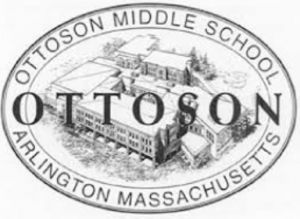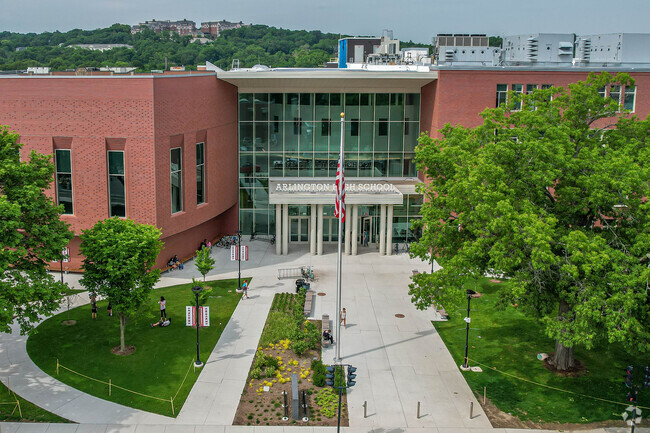Ninth Grade Heterogeneous Class Plan Remains In Limbo as School Officials Collect Community Data
The proposed heterogenous class plan gained widespread community attention after it was discussed at a school committee meeting on February 11th// Image credit ACMI
March 26, 2021
Arlington High School (AHS) is considering heterogeneous core classes for freshmen next year. Although originally the school committee had planned a vote to approve heterogenous class grouping mid-February, the action was postponed after further consideration. Heterogeneous classes are combined classes where students in the Advanced and Honors programs learn together, with extra work being offered to honors students for honors credit. The heterogeneous class plan was met with resistance from some eighth-grade students, who, in response to the proposal, circulated a petition protesting heterogeneous groupings. The petition amassed seventy signatures and was sent to Arlington High School administration as well as the school committee. It is unknown whether or not the document impacted the committee’s decision to postpone their vote.
According to AHS principal Dr. Janger, the difference between Advanced and Honors classes is less about the pace at which content is covered, and more about the standard of abstraction, conversation, and critical thinking that students are being held to. “You shouldn’t really walk into an Advanced or Honors class in biology, or in physical science, or in geometry, or in English and see a really big difference because of the level [of the class],” said Janger. The principal maintained that all students at AHS are held to a high standard appropriate to their class level. “The question simply is, are those students in separate classes, or are they working to those standards in the same class?”
Currently, AHS is studying ninth-grade honors participation rates in heterogeneous classes versus separate honors classes. This year, freshmen are taking heterogeneous classes to accommodate scheduling obstacles due to COVID. In the past, students were offered distinct honors options, but the success of this heterogeneous year may lead to reform in AHS’class programs. AHS also plans on organizing high school and eighth-grade focus groups to collect further student data regarding heterogeneous classes. According to Dr. Janger and other Arlington High employees, teacher feedback on heterogeneous learning has been positive so far. “The teachers felt that they actually had particularly rich and reflective discussions and engagement in the class that actually they felt very positive about…[They] felt very strongly that they actually had met and maintained high standards in terms of bringing folks along to meet the honors level curriculum standard,” reported Janger. This year, AHS saw a 12 percent increase in freshman honors enrollment under the new heterogeneous class changes, which Janger pointed out is “a pretty substantial change.”
School committee member Jane Morgan agrees with the committee’s choice to gather more data before coming to a decision about heterogeneous classes. “I think we also need to learn a lot more about how students who would have elected an honors class would be served in a heterogeneous class, and what sort of opportunities for additional work they would have,” she remarked.
As previously mentioned, in late February a student-led petition protesting heterogeneous classes was circulated around the eighth grade before being sent to Arlington school officials. Both Janger and Morgan view the document as a valid community data point in the heterogeneous class debate. “The fact that students felt strongly and then they wrote a petition that […] got 70 signatures on the petition, that is a piece of information,” acknowledged Dr. Janger. When asked about her thoughts on the petition, Ms. Morgan expressed the school committee’s enthusiasm towards hearing from students. “[Students are] probably the most important stakeholders,” she affirmed. “The committee certainly likes to hear from students, we take student concerns and desires very seriously.”
One major concern voiced by heterogeneous class petitioners was that mixed classes may detract from the honors-level class experience. In response to this concern, Dr. Janger emphasizes the importance of collective learning. “Whether we do heterogeneous classes or not, the sense that we all learn together, that [students are] not detracted from because kids who are not as good at school might be in the class, or kids who aren’t as ambitious about their work might be in the class has not proven to be the case,” he remarked. “I think it’s really helpful for [successful students] to think about what the larger institution and their classmates and everybody really has to offer them. Because sometimes if you get to the answer really quickly you stop listening to everybody else.” Furthermore, says Dr. Janger, the high school class experience is quite different from the middle or elementary school experience that eighth-graders are used to. The principal asserted that students mature in high school and learn to take their studies more seriously.
Right now, AHS and the school committee are in the process of collecting community data about heterogeneous classes. No official decision has been made as to whether or not there will be separate or mixed core class groupings for Arlington High freshmen next year, although ninth-grade class registration has opened.








